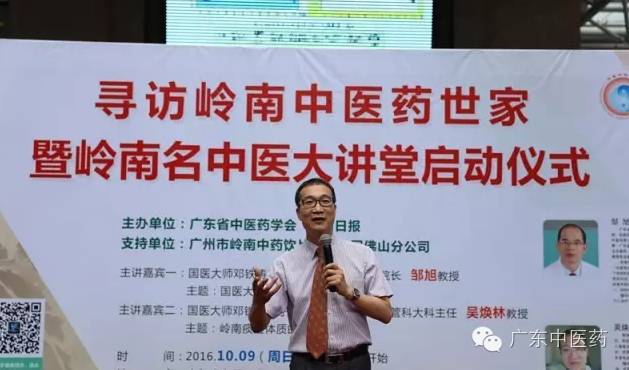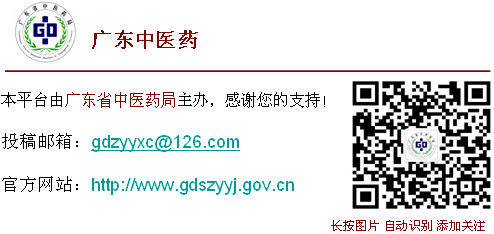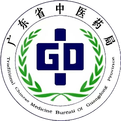
▲Professor Wu Huanlin is the academic successor of Master TCM Practitioner Deng Tie Tao and the head of the Cardiovascular Department at Guangdong Provincial Hospital of Traditional Chinese Medicine.
“Eating three hundred lychees daily, I would not hesitate to be a Lingnan person.” This famous quote by Su Dongpo not only made lychee famous but also the “Lingnan people.” Each region has its unique characteristics, and Lingnan people are notably prone to phlegm-damp constitution.
Professor Wu Huanlin points out that the phlegm-damp constitution poses many health risks, with common diseases such as hypertension, diabetes, and coronary heart disease prevalent among Lingnan people, leading to the saying, “All diseases are caused by phlegm.” How to “subdue” phlegm-damp and improve constitution is a high-level skill of renowned TCM practitioners.
Traditional Chinese Medicine (TCM) categorizes human constitution into nine types. Among Lingnan people, the proportions of Qi deficiency and phlegm-damp constitution exceed seventy percent!
Professor Wu Huanlin cites a research project that conducted TCM constitution identification on 6,525 individuals in Guangzhou. The results showed that the most common constitutions were Qi deficiency (2,635 cases) and phlegm-damp (2,029 cases), accounting for 40.38% and 31.10%, respectively.
What Causes Phlegm-Damp in Lingnan People?
Professor Wu Huanlin explains that the Lingnan region, bordered by the ocean to the south and the Wuling Mountains to the north, experiences a humid and hot climate due to its location at the intersection of marine and inland climates. This is reflected in the saying, “The land nurtures its people,” which contributes to the unique characteristics of Lingnan people, including excessive sweating, a love for swimming and bathing, and a preference for consuming cold foods, seafood, and other damp-inducing or greasy items. These factors are the root causes of the prevalence of phlegm-damp among Lingnan people.
TCM believes that congenital endowment, environmental influences, and organ dysfunction are all factors in the formation of constitution. Living in Lingnan, genetic factors are naturally the primary element contributing to the phlegm-damp constitution of local residents. Additionally, sedentary lifestyles, overeating, a preference for rich and greasy foods, excessive consumption of cold drinks, living in damp environments, exposure to rain, irregular sleep patterns, and a tendency to stay up late are all postnatal influences. Furthermore, the lungs are considered the “storage organ for phlegm,” the spleen is the “source of phlegm,” and the kidneys are the “root of phlegm.” When the lungs fail to disperse and descend, or the spleen loses its ability to transport and transform, or kidney Yang is insufficient, it leads to organ dysfunction and impaired transformation, resulting in the retention of dampness and phlegm.
Test: Eight Questions to Initially Determine if You Have a Phlegm-Damp Constitution
How can you determine if you have a phlegm-damp constitution? Professor Wu Huanlin suggests answering the following questions based on your experiences and feelings over the past year:
1. Do you feel chest tightness or abdominal fullness?
2. Do you feel heavy or uncomfortable in your body?
3. Is your abdomen soft and plump?
4. Is there excessive oil secretion on your forehead?
5. Are your upper eyelids more swollen than others, i.e., slightly raised?
6. Do you have a sticky feeling in your mouth?
7. Do you often have phlegm, especially feeling like there is phlegm stuck in your throat?
8. Is your tongue coating thick and greasy, or do you feel it is thick?
If most of your answers to the above questions are “yes,” you may initially be diagnosed with a phlegm-damp constitution. You can also consult a doctor to determine your constitution type using the TCM constitution classification table.
“In fact, phlegm-damp has its appearance,” says Professor Wu Huanlin. People with phlegm-damp tend to be “plump,” generally having a body shape that is overweight, especially with a soft and plump abdomen. In terms of facial appearance, they often have oily skin, and some may have a pale yellowish complexion with slightly puffy eyes. Observing the tongue, it may appear enlarged with a white, greasy coating, and there is often a sticky, greasy, or sweet sensation in the mouth, along with excessive phlegm. Individuals with phlegm-damp generally feel they sweat excessively and feel sticky, are prone to chest tightness, fatigue, and have a preference for sweet and greasy foods. Their bowel movements are usually normal or slightly loose, and their urine output is not much or slightly turbid.
Hazards: “All Diseases Are Caused by Phlegm”
There is a saying: “All diseases are caused by phlegm,” and “strange diseases are often due to phlegm.” This is indeed true. The phlegm-damp constitution poses significant health risks and can lead to a wide range of diseases.
Professor Wu Huanlin points out that if phlegm-damp accumulates in the liver, it can lead to fatty liver; if it accumulates in the abdominal cavity, it can result in “beer belly” or central obesity; if it flows downwards, it can cause lower limb edema; if it rises to the head, it can lead to frequent dizziness and mental fog; if it accumulates in the heart, it can cause chest tightness, shortness of breath, and palpitations; if it mixes with the blood, it can elevate blood lipids and pressure, leading to thickened blood, and even cervical spondylosis and lower back pain.
Thus, the disease tendencies caused by phlegm-damp include chest obstruction, dizziness, diabetes, stroke, and other conditions such as coronary heart disease, hypertension, cerebral infarction, obesity, hyperlipidemia, and diabetes in modern medicine.
Professor Wu Huanlin explains that tangible “phlegm” primarily accumulates in the lungs or stomach and is expelled through the mouth and nose as metabolic waste, easily causing cough and vomiting. In contrast, intangible “phlegm” accumulates within the body due to abnormal vaporization, leading to undetectable flow, foul decay, and accumulation throughout the body, which can easily cause dizziness, chest obstruction, diabetes, stroke, and other diseases. The pathogenic effects of dampness can lead to diarrhea and loose stools due to the interaction of internal and external dampness, similar to modern medical conditions like enteritis.
Exercise Recommendations for Phlegm-Damp Constitution
How can one nourish a phlegm-damp constitution? Professor Wu Huanlin suggests paying attention to the following aspects:
First: Environmental and Lifestyle Adjustments
① Avoid staying in damp environments for long periods, especially during rainy seasons, to prevent the invasion of dampness. Regularly check blood sugar, blood lipids, and blood pressure.
② Those who tend to oversleep should gradually reduce their sleep duration and engage in more outdoor activities to promote Yang energy, facilitate Qi flow, and activate bodily functions.
③ Take hot showers to promote sweating; wear loose clothing made of breathable natural fibers like cotton, linen, or silk to aid in sweat evaporation and eliminate internal dampness.
④ Pay attention to warmth. “Dampness moves with warmth and solidifies with cold.” Cold weather is detrimental to the transformation of dampness within the body and can harm the spleen and stomach, so avoid exposure to cold.
Second: Physical Exercise
Regular exercise is essential, such as walking, jogging, ball games, martial arts, Baduanjin (Eight Pieces of Brocade), and dancing. Swimming, especially in cold water, is not recommended as it can deplete Yang energy and increase dampness. Gradually increase the intensity of activities to help firm up loose flesh.
Additionally, aerobic exercises are particularly suitable for those with phlegm-damp constitution, such as walking, jogging, hiking, cycling, swimming, and Tai Chi. Initially, the duration can be shorter, around 5-10 minutes, gradually aiming for over 30 minutes to see effects, ultimately reaching over 60 minutes per session.
Third: Mental Adjustment
Phlegm-damp can lead to fatigue and sluggishness, so participate in various activities and listen to light music to invigorate the spirit and strengthen the spleen. Avoid depression and anger to prevent liver Qi stagnation and the internal generation of phlegm-damp.
Fourth: Dietary Regulation
① The diet should be light, avoiding rich, greasy, and cold foods.
② Consume more light foods that strengthen the spleen, eliminate dampness, and resolve phlegm, such as adzuki beans, lentils, broad beans, peanuts, loquat leaves, clams, jellyfish, fathead fish, olives, radishes, onions, winter melons, seaweed, water chestnuts, and bamboo shoots.
③ Alcohol should be consumed in moderation, and avoid overeating.
Fifth: Acupoint Therapy
For those with phlegm-damp constitution, phlegm resolution and dampness elimination can be achieved through acupuncture, cupping, or even massage at points such as Fenglong (ST40), Zhongwan (RN12), Yinlingquan (SP9), and Zusanli (ST36). Additionally, regularly alternating pressure on the abdomen can promote the breakdown of abdominal fat.
Expert Recommendations: Dietary Therapy for Phlegm-Damp Constitution
Professor Wu Huanlin notes that herbs such as Dangshen (Codonopsis), Bai Bian Dou (White Lentil), Sha Ren (Amomum), Chen Pi (Dried Tangerine Peel), Huai Shan (Chinese Yam), Yi Yi Ren (Job’s Tears), Fu Ling (Poria), Chi Xiao Dou (Adzuki Bean), Dong Gua Pi (Winter Melon Skin), and Bai Jie Zi (White Mustard Seed) have certain phlegm-eliminating properties. Bai Jie Zi and Chen Pi primarily target phlegm-damp in the lungs and upper jiao. Chen Pi combined with Dangshen and Bai Bian Dou can treat phlegm-damp in the middle jiao. Chi Xiao Dou primarily helps eliminate dampness through urination. Additionally, Cang Zhu (Atractylodes) and Fu Ling are effective in regulating the spleen and stomach, addressing the root of phlegm-damp.
Recipe 1: Red Bean and Job’s Tears Porridge:100g of Job’s Tears and 50g of red beans. Soak the red beans and Job’s Tears for 2 hours, then cook them in water to make porridge. This helps to promote urination, reduce swelling, and clear heat and dampness.
Recipe 2: Deng Lao Jian Xin Formula:15g of red ginseng, 3g of Chen Pi, and 5g of Tian Qi. When preparing, add a small amount of lean meat and stew. This can tonify Qi, resolve phlegm, and invigorate blood circulation.
Recipe 3: Er Ya Shen Qu Porridge:10g each of fried barley sprouts, fried wheat sprouts, and Shen Qu (Fermented Barley), and 50g of rice. When preparing, boil the herbs in water to extract the juice, then add rice to cook porridge, sweetening with sugar when done. This can strengthen the spleen and stomach, resolve phlegm-damp, and regulate blood lipids.
Herbal Tea 1:20-30g of Wuzhi Mao Tao (Five-Fingered Peach), 20-30g of Tu Fu Ling (Smilax), and 10-20g of fried Bai Bian Dou can strengthen the spleen, benefit Qi, and eliminate dampness.
Herbal Tea 2:15-20g of Fu Ling, 10-15g of Gui Zhi (Cinnamon Twig), 15-20g of Bai Zhu (White Atractylodes), 6-10g of Gan Cao (Licorice), and 10-15g of Hong Zao (Red Dates) can strengthen the spleen, promote dampness transformation, and warm phlegm.
Question: My family members all seem to have a phlegm-damp constitution. Which department should we consult for treatment? What dietary precautions should we take for phlegm-damp constitution?
Wu Huanlin: The phlegm-damp constitution is often familial, with obesity being a primary manifestation. The diet should avoid rich and greasy foods, and regularly use Chen Pi and Sha Ren to promote spleen and stomach function. Secondly, avoid excessive consumption of cold foods, and seafood should be eaten in moderation, along with relatively non-cold fruits and vegetables. Watermelon, pears, and bananas should be consumed sparingly. Thirdly, exercise is essential as it is a process of “generating fire,” which helps reduce phlegm. If treatment is needed, you can visit the Preventive Health Center at Guangdong Provincial Hospital of Traditional Chinese Medicine. ■
【Source: Guangdong Provincial Hospital of Traditional Chinese Medicine】
延伸阅读
Xi Jinping: Focus on Promoting the Revitalization and Development of Traditional Chinese Medicine
Mao Zedong: Elevating Traditional Chinese Medicine to a Global Contribution | Written by the Central Literature Research Office
Come and take it! Master TCM Practitioner Li Jiren’s Hypertension Treatment and Health Preservation Formula
Why do veteran TCM practitioners always remind us not to eat too much fruit?
Blocked meridians render any supplements ineffective! Six Symptoms of Blocked Meridians


